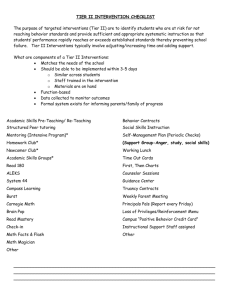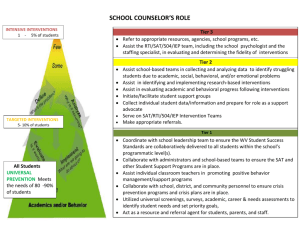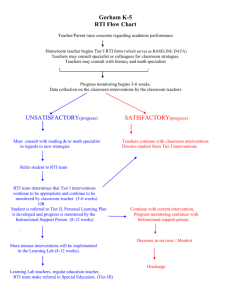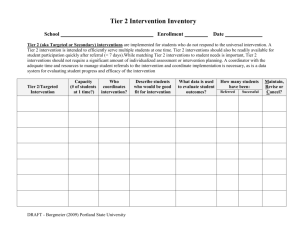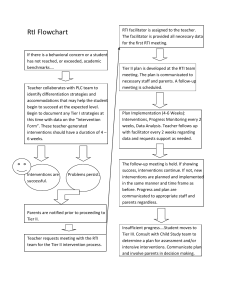Community Unit School District 95 Response to Intervention Plan
advertisement
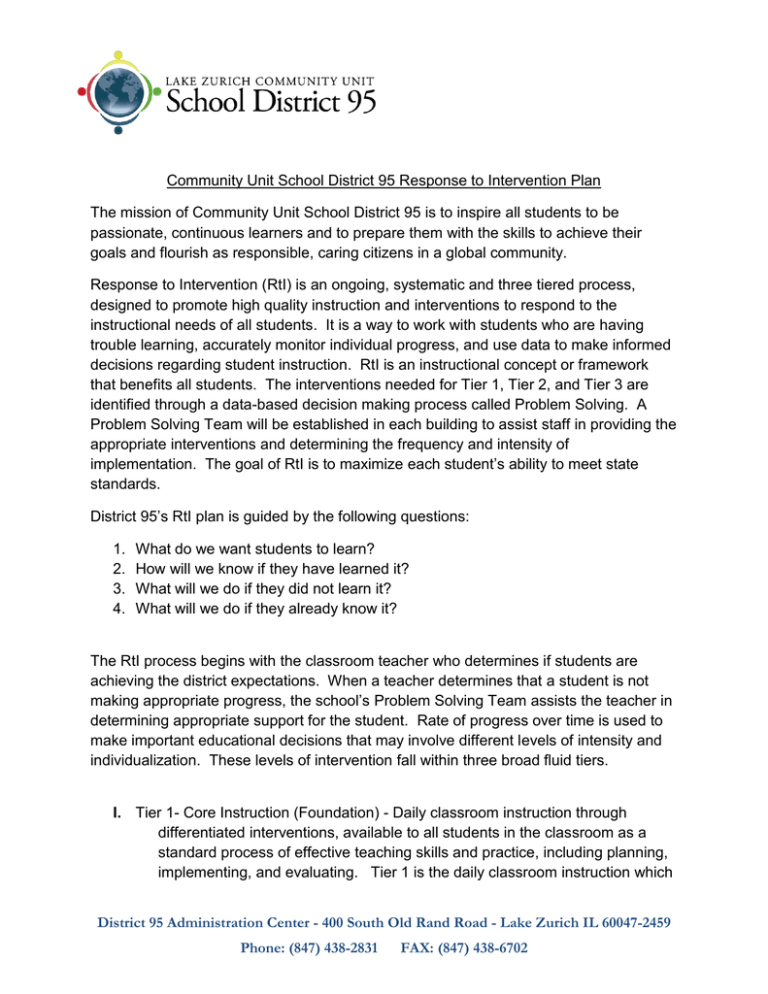
Community Unit School District 95 Response to Intervention Plan The mission of Community Unit School District 95 is to inspire all students to be passionate, continuous learners and to prepare them with the skills to achieve their goals and flourish as responsible, caring citizens in a global community. Response to Intervention (RtI) is an ongoing, systematic and three tiered process, designed to promote high quality instruction and interventions to respond to the instructional needs of all students. It is a way to work with students who are having trouble learning, accurately monitor individual progress, and use data to make informed decisions regarding student instruction. RtI is an instructional concept or framework that benefits all students. The interventions needed for Tier 1, Tier 2, and Tier 3 are identified through a data-based decision making process called Problem Solving. A Problem Solving Team will be established in each building to assist staff in providing the appropriate interventions and determining the frequency and intensity of implementation. The goal of RtI is to maximize each student’s ability to meet state standards. District 95’s RtI plan is guided by the following questions: 1. 2. 3. 4. What do we want students to learn? How will we know if they have learned it? What will we do if they did not learn it? What will we do if they already know it? The RtI process begins with the classroom teacher who determines if students are achieving the district expectations. When a teacher determines that a student is not making appropriate progress, the school’s Problem Solving Team assists the teacher in determining appropriate support for the student. Rate of progress over time is used to make important educational decisions that may involve different levels of intensity and individualization. These levels of intervention fall within three broad fluid tiers. I. Tier 1- Core Instruction (Foundation) - Daily classroom instruction through differentiated interventions, available to all students in the classroom as a standard process of effective teaching skills and practice, including planning, implementing, and evaluating. Tier 1 is the daily classroom instruction which District 95 Administration Center - 400 South Old Rand Road - Lake Zurich IL 60047-2459 Phone: (847) 438-2831 FAX: (847) 438-6702 includes differentiated instructional strategies. Typically, the instruction that occurs on a daily basis should meet 80-85 % of our student population. a. Teaching with the Lake Zurich CUSD 95 curriculum delivered with consistency throughout the grade levels and courses within the district. b. Differentiated instruction is provided within the regular education setting to meet the learning needs of students (the majority of students are successful within this tier). c. Targeted skill success is monitored through multiple data collection over time, using individual and common assessments. A typical time frame for assessing intervention effectiveness would be from 4-8 weeks, but may be shorter or longer. d. Based on collected data, if student is showing progress in the targeted skill (10-12 evaluations across time), the differentiated instruction may be eliminated for the targeted skill, or may be continued based on the student’s individual needs. There is no maximum time limit for such intervention. e. If a student does not show progress from multiple Tier 1 interventions across time, consider appropriate Tier 2 interventions. II. Tier 2 – Strategic Interventions (Supplemental) - Further interventions with greater frequency and/or intensity in the regular education setting, available to all students who did not make adequate progress in Tier 1 with a variety of differentiated instructional strategies or interventions across time. Tier 2 instructional interventions are in addition to Tier 1, and do not replace classroom instruction. a. Small groups in the classroom or outside the classroom are considered to generally have 4-6 students, but may be smaller or larger as appropriate to student needs. b. Interventions are provided in small group(s) via research validated instruction provided with consistency, where students move into and out of the group as skill requirements dictate. c. Targeted skill success is monitored through multiple data collection over time, using individual and common assessments. A typical time frame for assessing intervention effectiveness would be from 4-8 weeks, but may be shorter or longer. d. Based on collected data, if student is showing progress in the targeted skill (10-12 evaluations across time), the differentiated instruction may be eliminated for the targeted skill, or may be continued based on the District 95 Administration Center - 400 South Old Rand Road - Lake Zurich IL 60047-2459 Phone: (847) 438-2831 FAX: (847) 438-6702 student’s individual needs. There is no maximum time limit for such intervention. e. If a student does not show progress from multiple Tier 2 interventions across time, consider appropriate Tier 3 interventions. III. Tier 3 – Intensive Interventions (Intensive) - Further interventions with greater frequency and/or intensity in the regular education setting, available to all students who did not make adequate progress with multiple Tier 1 and Tier 2 interventions across time. Tier 3 consists of intensive instructional interventions in addition to core instruction to address specific skill deficits and increase the student’s rate of progress. The interventions increase in frequency of delivery, amount of time, and duration. In addition, the student to teacher ratio decreases. a. Small groups in the classroom or outside the classroom are considered to generally have 1-3 students as appropriate to student needs. b. Interventions are provided in small group(s) via research validated instruction provided with consistency, where students move into and out of the group as skill requirements dictate. c. Targeted skill success is monitored through multiple data collection over time, using individual and common assessments. A typical time frame for assessing intervention effectiveness would be from 4-8 weeks, but may be shorter or longer. d. Based on collected data, if a student is showing progress (10-12 evaluations across time), the differentiated instruction may be eliminated for the targeted skill, or may be continued based on the student’s individual needs. There is no maximum time limit for such intervention. If a student does not show progress from multiple Tier 3 interventions across time, a request for additional support from the problem solving team at the building level may be initiated. The RtI process does not deny or delay a formal evaluation for special education. At any point in the process, parents can request a formal evaluation to determine eligibility for special education. The data collected during Tiers 1, 2, and 3 are used to help make that decision. District 95 Administration Center - 400 South Old Rand Road - Lake Zurich IL 60047-2459 Phone: (847) 438-2831 FAX: (847) 438-6702
